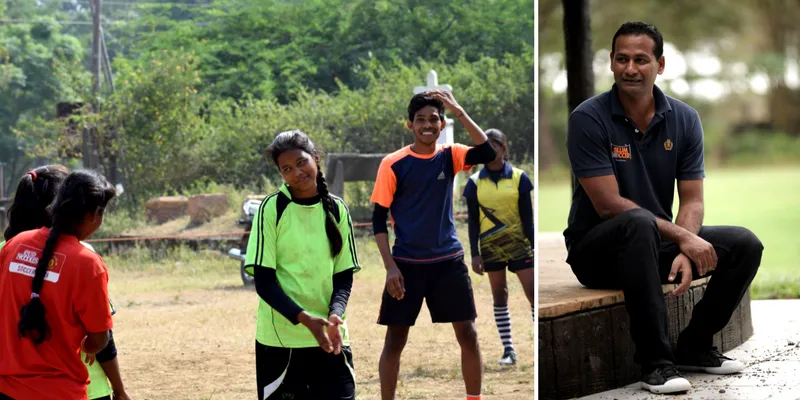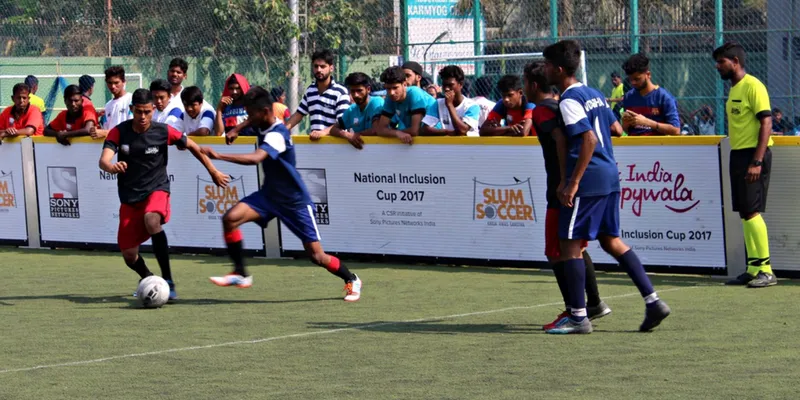As FIFA fever spikes, a closer look at organisations helping young footballers change their life’s game plan
Organisations and NGOs across India are scouting for the next Lionel Messi, Cristiano Ronaldo or Bhaichung Bhutia in slums, villages, and Naxal-hit regions.

Across the world, football is seen as a unifier, something that breaks barriers - political, ethnic, socio-religious, and even economic. All eyes may be on the FIFA World Cup in Russia for now, but closer home in India, children - across states and economic backgrounds - are honing their football skills, thanks to social startups and NGOs.
Be it the Naxal-hit state of Chhattisgarh, children in Mumbai slums, or Haryana girls representing India at international level— the sport has led to development of children and become a tool for social change.
We take a closer look at the organisations that are bringing about this change:
1. Indian Football Foundation
In 2012, Bhaichung Bhutia established Indian Football Foundation (IFF) to discover and nurture young footballers between the ages of seven and 19. The goal is to benefit both the player and the sport.

“I am cognisant of the current unhealthy state of professional and youth football in India. I feel it is my duty to undertake this responsibility to bring a fundamental change and ensure young talent is nurtured in the best possible manner. IFF is a step in this direction as it will provide those opportunities to the most talented players irrespective of their socio-economic background,” Bhaichung says.
IFF’s vision is to provide sustained support in sport and other development to footballers aged seven to 19. Coaches and teachers, too, are given training so that these youngsters’ skills can be honed to the fullest. Till date, three of IFF’s boys — Sayak Barai, Anuj Kumar, and Rohit Kumar — have represented India in football.

Kshitij Kumar Singh, a student of Bhaichung Bhutia Football Schools— a sister concern that supports IFF, has been selected to represent the NEC Nijmegen U-15 academy team in Holland after appearing for a trial with the club in 2017.
IFF currently has 150 players aged between seven and 19. It functions out of Delhi, and provides financial support and mentorship to urban, disadvantaged boys scouted from various local clubs and schools.
2. Slum Soccer
In 2001, Vijay Barse, a retired sports teacher in Nagpur, started Slum Soccer with an aim to transform the lives of children living in slums through football. What started as a simple weekend coaching initiative is now an organisation with fledged football coaching camps, educational classes, and healthcare workshops.

Zopadpatti football, as it was dubbed in its initial days, aimed at bringing in youngsters from underprivileged and difficult backgrounds to tackle drug abuse, anti-social activities, poverty, social alienation, and personal struggles.
The organisation offers seven programmes for overall development of children, including coaches training programmes, livelihood training programme, health camps, and young leaders programme. Slum Soccer also puts special focus on education through its project Edukick, which focuses on the promotion of primary education for children from underprivileged sections of society. Also on Slum Soccer’s agenda is the development of women football.
Over the past decade, Slum Soccer has offered much-needed sporting opportunities and personal development programmes to disadvantaged youth across the country.

The Nagpur-based organisation has impacted nearly 70,000 children across six states in the country over the past decade, including Reena Panchal, the captain of the India women’s team at Homeless Soccer World Cup held in Amsterdam in 2015.
3. Stairs
Right from a very young age, Siddhartha Upadhyay, Founder of Stairs and recipient of the prestigious Rashtriya Khel Protsahan Puruskar, knew and understood the importance of sports in a person’s life. He knew the role it played in fostering a child’s life by giving them direction and inculcating team spirit and discipline.

He recalls, “I was merely 20 years old at the time. Back in the day, the importance of sports in a child’s education was missing, and I found everyone around me glued to the TV instead. Thankfully, I was active in sports and could see the person it had shaped me into.”
Stairs provides a platform where youngsters from disadvantaged sections of society get a chance to showcase their talent in sports and foster it as a means of livelihood. As part of the process, the children are also taught character and personality building.
Stairs has developed a strategy of involving communities around it to support its programmes. The organisation identifies underprivileged youth through local community leaders who are identified and chosen based on their involvement with the organisation’s regular work.
Siddhartha set up the first centre in 2005 with the launch of the Khelo Delhi programme, where football, volleyball, cricket, and Sepak Takraw were played as part of the programme. That programme is now the Uflex Khelo Dilli.

Stairs also organises tournaments to provide youth with opportunities to showcase their talent and facilitate their selection into teams.
More than 150,000 youngsters are playing in Stairs centres across the country. The organisation currently has a presence in six states of India—Delhi NCR, Haryana, Himachal Pradesh, Uttar Pradesh, Jharkhand, and Orissa. Plans are currently under way to open centres in two more states – Punjab, and Jammu and Kashmir.
4. Sukma Football Academy
Established in January 2017, the Sukma Football Academy is an initiative by the District Administration of Sukma to use football as a medium of empowerment.

The academy’s vision is to groom youngsters to take up football as a career and, to this end, it provides the necessary infrastructure required to nurture professional players of the highest calibre and uses scientifically advanced coaching methods. As many as 40 talented children, some from the remotest regions of the district, are now being coached at the Academy.
“If you look around in Sukma, we have a number of educational institutions that provide much-needed quality education. If anything was missing, it was a good sports academy that would help in all-round development of students. The Sukma Football Academy aims to give children that opportunity,” says Virupaksh Puranik, District Sports Officer.

The academy has collaborated with a local NGO to unearth fresh talent. Most of the children come from agricultural households, with families dependent on daily wages or those that have been deeply affected by the aftermath of Naxalism.
The children, aged between 8 and 11 years, attend local schools for their scholastic needs, while the academy becomes their second home.
5. Alakhpura Football Club
Founded in 2012, the Alakhpura Football Club based in Bhiwandi village in Haryana has sent around a dozen women to the international level to represent India. "There is a footballer in every house," say villagers, taking pride in their girls.

The man behind this change is village school coach, Gordhan Dass, who started to teach girls football when they “began pestering him” to teach them sports.
“'Indulge us in sports! We also want to play!' They wanted to play. So, I gave them a football lying in our sports room,” he recalls.
Around 40-50 young girls began kicking the ball around for fun. For around two years, the girls kept playing — and got better. They started learning the techniques by themselves and he saw their potential if given the correct guidance. And this was the beginning of Bhiwandi’s football journey.
Sonika Bijarnia, who took over as coach after Dass was transferred to nearby Barsi, said: “We started with limited resources — very few balls, one ground full of pits and prickles. Now, the government is ready to install synthetic turf on one of our grounds.”

Girls who have played at the state-level have got scholarships that helped in their advancement, consequently compelling their parents to believe in their game. Many of them have got government jobs through the sports quota.
Sanju Yadav, from Bhiwandi village, who participated in the Indian Women's League last year became the top scorer with 11 goals. The football club also has two consecutive Subroto Cup (national championship for schools) titles to its name in the under-17 category.







